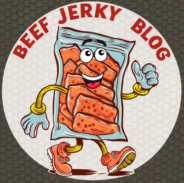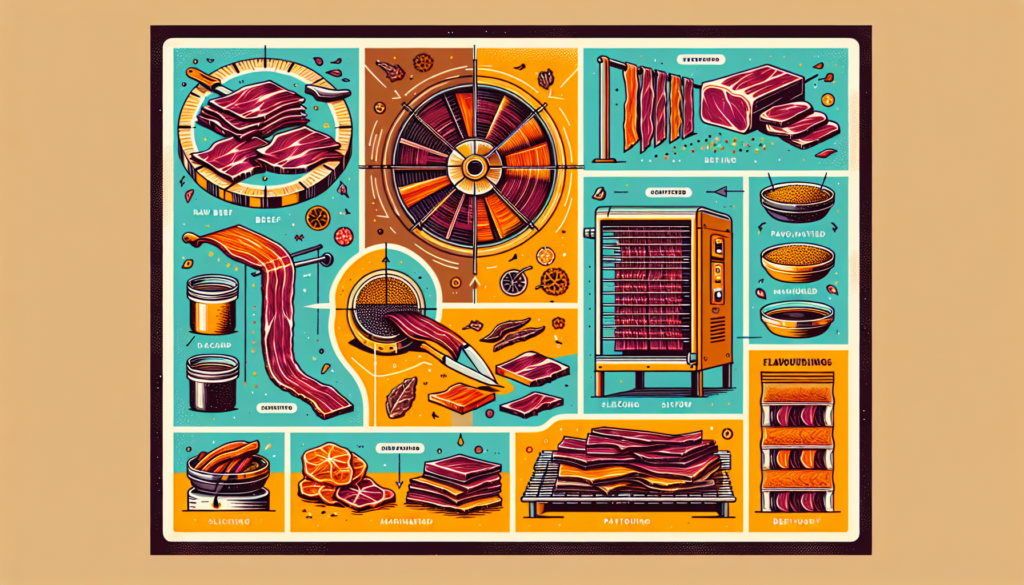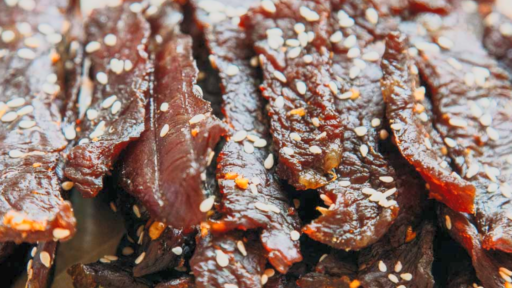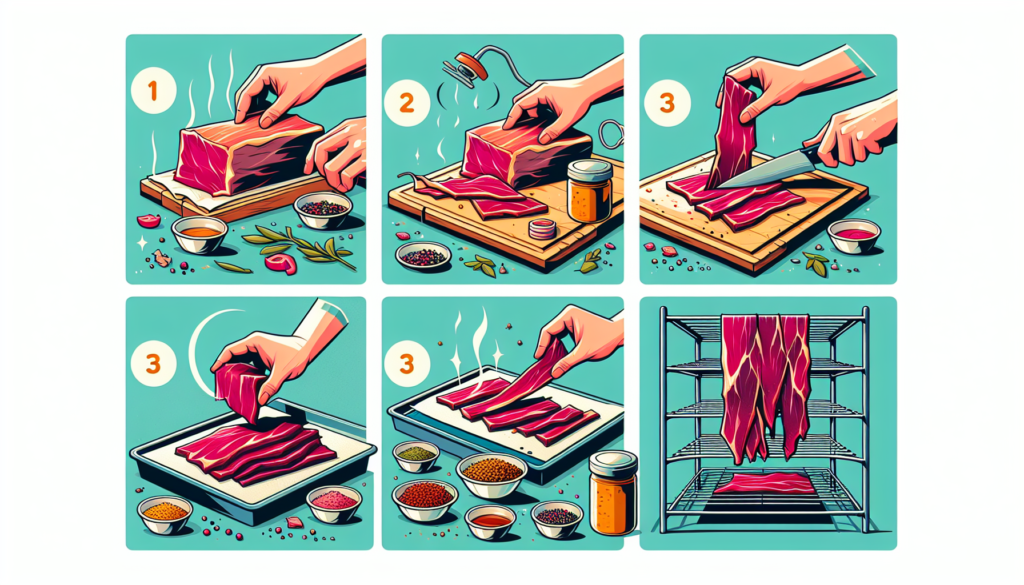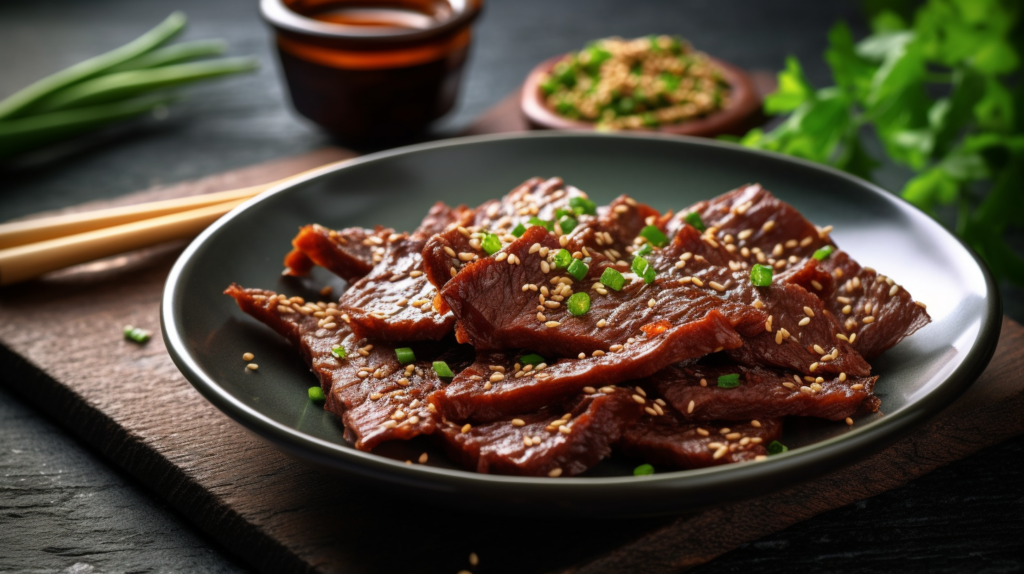
Jerky lovers, I salute you. Hello, Ronnie here. When you’re pregnant, the question “Can You Eat Beef Jerky While Pregnant?” may arise, especially if you find yourself craving it among other foods. It’s crucial to weigh the potential risks of consuming such items during pregnancy. The concerns surrounding eating beef jerky stem primarily from its preparation methods and ingredients. Processed foods, which include not only beef jerky but also items like hot dogs, due to their higher sodium content, present a larger risk compared to consuming fresh, lean protein sources.
While cravings can be strong, there are tips for safely enjoying beef jerky when expecting. Opting for homemade jerky made from lean cuts of meat can reduce some risks. However, it’s crucial to understand the safety measures needed to ensure that the jerky does not contain harmful bacteria that could pose a risk to you and your baby. Always consider the potential risk of raw meat and seek safer alternatives or preparation methods.
Understanding the Risks: Can You Eat Beef Jerky During Pregnancy
Beef jerky’s safety during pregnancy is a topic of concern due to the process of drying meat, which is how jerky is made. This process, if not done correctly, can leave room for bacteria to survive, posing health risks. Drying meat is a traditional method for preserving it, but when it comes to pregnancy, the standards for what is considered safe to consume change significantly.
It’s crucial to ensure that any jerky consumed during pregnancy has been prepared with safety in mind. The drying process must be thorough enough to kill any harmful bacteria without compromising the nutritional value of the meat. Understanding these safety measures can help mitigate risks associated with consuming beef jerky while pregnant.
Food-borne Illness Concerns with Beef Jerky
Eating beef jerky while pregnant can raise concerns about foodborne illnesses. Since jerky is dried and not cooked in a way that high temperatures kill all bacteria, it can be a risky food choice for pregnant women. The risks associated with consuming beef jerky come from the possibility of it containing bacteria like Salmonella or E. coli, which are more harmful during pregnancy.
Furthermore, because beef jerky is a dried meat product, it doesn’t go through the same safety checks as other meat products might, such as those that are fully cooked. This lack of thorough cooking means that if the meat was undercooked or the drying process wasn’t carried out correctly, there could be a higher chance of encountering undercooked animal proteins, which can be dangerous during pregnancy.
Exploring the Risk of Toxoplasmosis
One of the significant concerns with consuming undercooked or contaminated meat products, like beef jerky, during pregnancy is the risk of toxoplasmosis. This infection is caused by a parasite that can be found in raw meat. Toxoplasmosis is a concern because it can compromise the immune system, which is often already weakened during pregnancy.
Additionally, food-borne illnesses such as those caused by listeria bacteria can be particularly dangerous. Listeria can cross the placenta, potentially leading to miscarriage, stillbirth, or severe illness in newborns. Therefore, understanding and minimizing the risk of food-borne illnesses is crucial when considering whether to consume beef jerky while pregnant.
The High Sodium Content in Beef Jerky
Another concern if you can eat beef jerky while pregnant is its high sodium content. Consuming foods with high sodium levels can lead to increased blood pressure, putting your health at risk. This is particularly concerning during pregnancy, where managing blood pressure is crucial for the health of both mother and baby.
Excessive sodium intake can also lead to discomfort, such as sore throat and muscle aches, and can negatively impact the balance of hydration in your body. It’s essential to monitor sodium intake and opt for foods like fresh vegetables that provide essential nutrients without the added risk.
Managing Blood Pressure Spikes
High blood pressure during pregnancy can lead to conditions such as preeclampsia, which is dangerous for both the mother and baby. Given the high sodium content in beef jerky, it’s wise to be cautious about its consumption. Reducing intake of high-sodium foods and focusing on a balanced diet can help manage blood pressure levels effectively.
Regular check-ups with a healthcare provider can help monitor your blood pressure and provide guidance on dietary choices that support a healthy pregnancy. Remember, moderation is key, and understanding how certain foods like beef jerky affect your body can help you make informed decisions about your diet.
Making Beef Jerky a Safer Choice When Expecting
For those who crave beef jerky during pregnancy but are concerned about the risks, there are ways to make it a safer choice. Opting for commercially produced jerky that adheres to strict safety standards can reduce some risks. These products are often made with safety measures that ensure the meat is dried at a temperature high enough to kill harmful bacteria.
Additionally, looking for beef jerky varieties specifically marked as safe for pregnant women can provide an extra layer of reassurance. Manufacturers may offer products that have undergone additional safety processes, such as pasteurization, to ensure they are safe for everyone to consume, including expectant mothers.
Opting for Low-Sodium Beef Jerky Varieties
While you may ask if you can eat beef jerky while pregnant, choosing low-sodium varieties can help mitigate some health concerns. Consuming beef jerky, especially those options designed to be lower in sodium, can help manage blood pressure levels and reduce the risks associated with consuming high-sodium foods.
By carefully selecting brands and types of beef jerky that prioritize lower sodium content, you can satisfy your cravings without putting your health at risk. Always check the nutritional information and look for products that align with a pregnancy-safe diet.
The Importance of Choosing Lean Beef and High-Quality Products
Selecting lean beef and high-quality products when consuming beef jerky during pregnancy can also make a significant difference. Lean protein sources are healthier and provide the nutrients needed without the added fats and preservatives found in some jerky products.
Ensuring the beef jerky comes from a reputable source and contains high-quality ingredients can reduce the risk of contamination and other health concerns. It’s about finding the balance between satisfying cravings and prioritizing your and your baby’s health.
Allergen-Free Options for Sensitive Diets
For expectant mothers with dietary restrictions or sensitivities, seeking allergen-free options when it comes to beef jerky can be beneficial. Many brands now offer beef jerky made without common allergens, catering to a wider range of dietary needs.
These allergen-free options ensure that you can enjoy beef jerky without worrying about triggering any allergic reactions or sensitivities. Always read labels carefully and choose products that meet your specific dietary requirements.
Evaluating the Nutritional Benefits of Beef Jerky for Pregnant Women
While there are concerns, beef jerky can also offer nutritional benefits when consumed in moderation during pregnancy. It is a source of lean protein, which is essential for the development of your baby. However, it’s crucial to be mindful of the risk of contamination, ensuring that the jerky you choose is safe and fits within a balanced diet.
The immune systems of pregnant women can be more susceptible to food-borne illnesses, making it essential to select beef jerky products with care. Opt for those known for their quality and safety to enjoy the benefits without the risks.
The Role of Protein, Iron, and Zinc in Pregnancy
Protein, iron, and zinc play critical roles in pregnancy, supporting fetal growth and development. These nutrients are vital for building the baby’s muscles and bones and supporting the mother’s health. Including lean protein sources in your diet can contribute to meeting these nutritional needs.
However, it’s important to balance the intake of these nutrients with the potential risks associated with processed meats. Opting for diverse sources of protein, iron, and zinc can ensure you receive the benefits while minimizing risks.
Homemade Jerky: A Safer Alternative?
Homemade options can offer a safer alternative to store-bought options and address the question if you can eat beef jerky while pregnant . By controlling the ingredients and the preparation process, you can ensure that the meat is properly dried and free from harmful bacteria. This method allows for the customization of seasoning, enabling the creation of a lower-sodium product.
However, it’s crucial to follow safety guidelines strictly to ensure that the homemade jerky is safe to consume. Properly sourcing the meat, using a precise drying method, and storing the jerky correctly are all critical steps in this process.
Steps to Ensure Your Homemade Jerky Is Safe
To ensure your homemade jerky is safe, start by selecting the right cuts of meat and trimming any fat, as fat can spoil more quickly. Use a dehydrator or an oven set to the correct temperature to effectively kill harmful bacteria. The key is to dry the meat thoroughly, as moisture can encourage bacterial growth.
Additionally, storing the jerky in airtight containers and keeping it refrigerated or frozen if not consumed within a couple of days can further reduce the risk of contamination. Following these steps can help you enjoy homemade jerky safely during your pregnancy.
Moderation and Mindful Consuming
When it comes to the question of can you eat beef jerky during pregnancy, moderation and mindfulness are key. It’s crucial to be aware of the levels of sodium in beef jerky, which can be quite high. High sodium intake can lead to increased blood pressure, a concern during pregnancy. Therefore, it’s important to limit the amount of beef jerky consumed and to choose lower-sodium options whenever possible.
Mindful consuming also involves paying attention to how your body reacts to beef jerky. If you notice any adverse effects, it may be wise to reduce your intake or avoid it altogether. Remember, your health and the health of your baby come first, so always err on the side of caution when it comes to consuming beef jerky while pregnant.
Portion Sizes So You Can Eat Beef Jerky While Pregnant
Portion control is vital when eating beef jerky during pregnancy. To avoid consuming too much sodium, limit your intake to small, infrequent servings. A good rule of thumb is to have no more than a few pieces of beef jerky a day, ensuring you’re not exceeding daily sodium limits. Pairing beef jerky with low-sodium foods can also help balance your overall intake.
Keeping track of how much beef jerky you consume can also help you stay within safe limits. Consider dividing jerky into individual portions ahead of time. This can prevent overeating and make it easier to monitor your consumption, ensuring you and your baby stay healthy.
Understanding Daily Limits
When it asking yourself if you can eat beef jerky while pregnant, understanding daily limits for sodium and other nutrients is crucial. The American Heart Association recommends limiting sodium intake to no more than 2,300 milligrams a day, with an ideal limit of no more than 1,500 milligrams for most adults. Given the high sodium content in beef jerky, it’s essential to factor this into your daily consumption to avoid exceeding these limits.
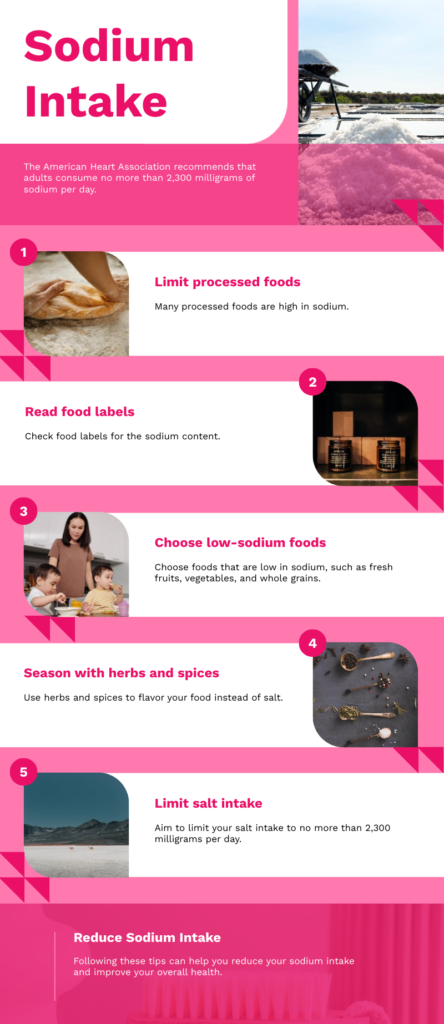
By keeping track of your sodium intake and choosing lower-sodium beef jerky options, you can enjoy this snack without compromising your health or the health of your baby. Always read labels carefully and consider your overall dietary intake to ensure you’re staying within recommended guidelines for a healthy pregnancy.
Addressing If You Can Eat Beef Jerky While Pregnant
Many pregnant women have concerns about consuming beef jerky, primarily due to the risk of food-borne illnesses and high sodium content. When considering consuming beef jerky, it’s important to choose products that are fully cooked and packaged by reputable companies. This can significantly reduce the risk of consuming harmful bacteria that could affect your pregnancy.
Additionally, many wonder if the occasional craving for beef jerky is safe. While it’s generally safe in moderation, it’s crucial to opt for low-sodium and high-quality options. Always consult with your healthcare provider if you have any concerns about your diet during pregnancy, including the consumption of beef jerky.
If Cravings Strike: Interpreting Your Body’s Signals
Cravings for foods like beef jerky during pregnancy can be strong, but it’s important to interpret these signals wisely. Sometimes, cravings can indicate a need for certain nutrients, such as protein or iron, both of which are present in beef jerky. However, it’s essential to satisfy these cravings in a healthy way, mindful of the potential risks and nutritional content.
Consider balancing your diet with a variety of nutrient-rich foods that can fulfill these needs without the high sodium and potential risks associated with beef jerky. If you do indulge, choose high-quality, low-sodium options and consume in moderation, always listening to your body and consulting with your healthcare provider as needed.
Did You Eat Beef Jerky While Pregnant? What Symptoms to Monitor
If you’ve indulged in consuming beef jerky during pregnancy, it’s important to monitor how your body responds. Pay attention to any unusual symptoms, such as increased thirst from high sodium levels, and ensure you drink plenty of water to stay hydrated. If you experience any adverse effects, consider reducing your intake or avoiding beef jerky altogether.
Keeping a food diary can also be helpful to track your consumption of beef jerky and other foods during pregnancy. This can help you identify any correlations between what you eat and how you feel, allowing you to make informed decisions about your diet moving forward. Always prioritize your health and the well-being of your baby when making dietary choices.
Is Beef Jerky Ever Truly Raw?
One common misconception about beef jerky is that it might be raw. However, the process of making beef jerky involves curing and drying the meat, effectively eliminating moisture to prevent bacterial growth. This process also cooks the meat, ensuring that beef jerky is not raw but rather a type of preserved, cooked meat. Understanding this can alleviate concerns about consuming raw meats during pregnancy.
Despite this, it’s still important to choose high-quality beef jerky products to ensure safety. Opt for jerky from reputable sources and check packaging for any indications of proper food safety handling. This can help minimize any potential risks associated with consuming beef jerky while pregnant.
The Question of Pasteurization in Jerky Products
Pasteurization is a process that kills harmful bacteria in foods, making them safer to eat. While most beef jerky undergoes a drying and curing process that reduces moisture and prevents bacterial growth, it’s not the same as pasteurization. However, the safety standards for producing commercial beef jerky are designed to ensure that the product is safe for consumption, including for pregnant women when consumed in moderation.
If you have concerns about the safety of beef jerky, look for products that have undergone additional safety treatments such as high-pressure processing (HPP). This can provide an extra layer of assurance. Remember, when in doubt, consult with your healthcare provider to make the best dietary choices during your pregnancy.
Gestational Diabetes and Beef Jerky Consumption
If you have gestational diabetes, it’s crucial to monitor your diet closely, especially when it comes to foods like beef jerky. Beef jerky, while a good source of protein, often contains added sugars and is high in sodium. These elements can influence your blood sugar levels and make managing gestational diabetes more challenging. Opting for varieties with no added sugars and lower sodium content can be a better choice, but always consult your healthcare provider first.
Remember, your body’s response to certain foods during pregnancy can be unpredictable. Therefore, keeping a close eye on how your body reacts after consuming beef jerky is important. If you notice any unusual spikes in your blood sugar levels, it might be best to avoid it altogether. Always prioritize foods that support stable blood sugar levels for a healthier pregnancy journey.
Foods to Embrace and Avoid for a Healthy Pregnancy
Nourishing your body with the right foods during pregnancy is not just about avoiding what’s bad but also about embracing what’s beneficial. Focus on incorporating a variety of fruits, vegetables, lean proteins, and whole grains into your meals. These foods provide essential nutrients that support both your health and the development of your baby. Remember to stay hydrated by drinking plenty of water throughout the day.

On the other hand, certain foods should be avoided to minimize the risk of food-borne illnesses and nutritional imbalances. Avoid raw or under-cooked meats, unpasteurized dairy products, and high-mercury fish. These can pose health risks to both you and your baby. Always ensure your meals are well-cooked and opt for pasteurized products to keep you both safe and healthy.
Nutrient-Rich Foods to Favor So You Can Eat Beef Jerky While Pregnant
During pregnancy, your nutritional needs increase to support your baby’s growth and development. Foods rich in protein, iron, calcium, and folic acid are especially important. Lean meats, beans, tofu, leafy greens, and nuts are excellent protein and iron sources. Dairy products and fortified plant milks can provide the necessary calcium, while leafy greens and fortified cereals offer folic acid. These nutrients play a crucial role in supporting a healthy pregnancy.
Additionally, incorporating a variety of whole grains, fruits, and vegetables into your diet ensures you and your baby receive a wide range of essential vitamins and minerals. These foods not only support your health but also help build your baby’s body and brain. Aim for a colorful plate at every meal to maximize the nutritional benefits.
Foods to Steer Clear of During Pregnancy
Certain foods pose a higher risk during pregnancy and should be avoided to ensure the health and safety of both you and your baby. These include raw or under-cooked meats, unpasteurized dairy products, and certain types of seafood known to be high in mercury. Also, steer clear of deli meats and soft cheeses unless they are clearly labeled as pasteurized or thoroughly cooked to the proper internal temperature.
Raw eggs, unpasteurized milk, raw oysters, and raw scallops are also on the list of foods to avoid. These items can harbor harmful bacteria and viruses that increase the risk of food-borne illnesses. Your immune system is compromised during pregnancy, making it harder to fight off infections. Choosing cooked and pasteurized food options can help protect you and your baby from these risks.
Choose Wisely: Eat Turkey or Beef Jerky While Pregnant?
When it comes to satisfying pregnancy cravings, the debate between turkey and beef jerky is notable. Both can be appealing options for a quick protein fix, but when considering nutritional content and health implications during pregnancy, turkey jerky often emerges as a lower-sodium alternative. However, it’s essential to read labels carefully, as some turkey jerky varieties may still be high in sodium or contain added sugars and preservatives.
Moreover, regardless of the type, jerky should be consumed in moderation. Excessive intake of processed meats, whether turkey or beef, can contribute to increased blood pressure during pregnancy, which is a concern. Always consider the broader context of your diet and consult with your healthcare provider to make choices that best support your health and the health of your baby.
Considering Turkey Jerky as a Lower-Sodium Alternative
If you’re leaning towards turkey jerky as a snack during pregnancy, opting for a lower-sodium version is wise. High sodium intake can lead to increased blood pressure, which is a concern during pregnancy. Turkey jerky can be a delicious and satisfying choice if you carefully select brands that prioritize health, offering low-sodium and minimally processed options.
When satisfying those inevitable pregnancy cravings, remember that moderation is key. While turkey jerky offers a tasty and convenient protein source, balancing it with other nutrient-rich foods ensures you and your baby receive the full spectrum of necessary nutrients. Always aim for a balanced diet that supports your health and pregnancy well-being.
Final Insights: Balancing Safety and Cravings
During pregnancy, balancing safety and cravings can be challenging, especially when it comes to foods like beef jerky. While beef jerky can be a delicious and satisfying snack, it’s essential to prioritize safety by choosing options that are fully cooked and low in sodium. Mahogany smoked meats or premium jerky varieties often offer safer, more flavorful options. Additionally, exploring beef jerky online can provide access to a wider selection of quality products tailored to pregnant women’s needs.
Remember, moderation is crucial. Even the safest beef jerky options should be consumed in moderation to avoid excessive sodium intake and the risk of food-borne illnesses. Always listen to your body and consult with your healthcare provider to make informed decisions about including beef jerky in your diet during pregnancy. Balancing your cravings with the need for safety ensures a healthy pregnancy journey for both you and your baby.
The Bottom Line: Can You Eat Beef Jerky While Pregnant?
When it comes to consuming beef jerky during pregnancy, the bottom line is caution. While it can be a delicious snack, the risk of food-borne illness cannot be overlooked. Pregnant women’s immune system is compromised, making it harder to fight off infections that could lead to serious health issues like food poisoning, preterm labor, or even birth defects. Therefore, ensuring the beef jerky is fully cooked and opting for low-sodium, high-quality options is essential.
Moreover, consider your overall diet and how beef jerky fits into it. Avoid overindulging in processed meats and aim for a balanced diet rich in whole foods. This will not only satisfy your cravings but also support a healthy pregnancy. Always consult your healthcare provider before making dietary changes, especially when your go-to snack before pregnancy was beef jerky. They can offer personalized advice to ensure both you and your baby remain healthy.
